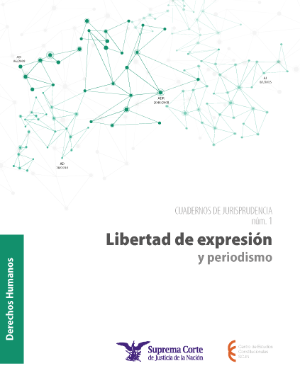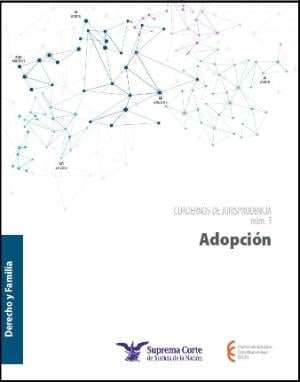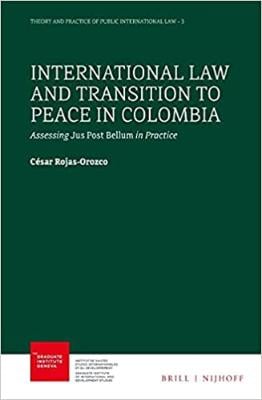
|
Libertad de expresión y periodismo
La libertad de expresión es crucial para el desarrollo de sociedades democráticas. Como lo destaca la Relatoría Especial para la Libertad de Expresión (RELE) de la Comisión Interamericana de Derechos Humanos (CIDH), la pluralidad y deliberación democráticas se encuentran condicionadas a contar con sistemas efectivos de protección y fomento a la libre circulación de información, ideas y expresiones de todo tipo.1 El ejercicio de este derecho contribuye al desarrollo de una opinión pública informada y al control ciudadano efectivo sobre la gestión pública.2 Además, la libertad de expresión es también un derecho clave para garantizar el ejercicio de otros derechos fundamentales.
|

|
Adopción
La relación entre realidad y regulación jurídica confluyen frecuentemente en algunas etapas y momentos históricos, como el actual, donde legisladores y juzgadores deben dilucidar de la mejor forma posible diversos intereses, derechos, leyes y libertades, entre otras consideraciones. Esta transversalidad no se encuentra exenta de tensiones ideológicas, morales, ius filosóficas y religiosas; algunas de las cuales se abordan en este compendio de jurisprudencia en torno a la adopción en nuestra legislación mexicana. Se expone la forma en que la Suprema Corte sopesa y jerarquiza el interés superior de la niñez, los derechos de la infancia y el pleno goce de derechos de sectores como los matrimonios del mismo sexo y quienes buscan ejercer una paternidad monoparental entre otros.
|
|
Conflictos entre derechos: ensayos desde la filosofía práctica
Como parte de la línea de investigación sobre metodologías de la adjudicación constitucional se presenta la obra Conflictos entre Derechos. Ensayos desde la filosofía. Los autores reunidos en ella tocan diversos temas en torno a los derechos y los conflictos entre derechos; cómo se configuran esas disputas; en qué sentido el choque entre opciones respaldadas por razones institucionales y prácticas se resuelve racionalmente; y qué relación hay entre la respuesta racional al conflicto y la legitimidad de las decisiones jurídicas. La obra se compone de textos inéditos en español desde diferentes posturas jurídico-filosóficas, siendo un aporte para el lector hispanohablante interesado en los fenómenos normativos relacionados con los derechos.
|
|
|

|
International Law and Transition to Peace in Colombia: Assessing Jus Post Bellum in Practice
In International Law and Transition to Peace in Colombia, César Rojas-Orozco analyses the role of international law in transition from armed conflict to peace, by using the analytical framework of jus post bellum and Colombia as a case study. While contemporary attention to jus post bellum has focused on its theoretical development and regarding international warfare, this book is the first work to comprehensively assess the concept in practice and in the context of a non-international armed conflict. Discussing the creative formulas adopted in Colombia to conciliate international legal requirements and the practical needs of peace, the book offers concrete elements to understand the concept of jus post bellum as a framework to guide other transitions around the world. Readership: Scholars and practitioners interested in the role of international law at peacemaking and peacebuilding, in the concept of jus post bellum, and in the Colombian transition to peace.
|
|
|
Parental Guidance, State Responsibility and Evolving Capacities: Article 5 of the United Nations Convention on the Rights of the Child
This book arises out of a CRC Implementation Project colloquium on Article 5 of the UN Convention on the Rights of the Child. Article 5 protects the responsibilities, rights and duties of parents or others to provide, in a manner consistent with the evolving capacities of the child, appropriate direction and guidance in the exercise by the child of his/her rights. In this interdisciplinary collection, leading international scholars address the interplay of parental guidance, state responsibility and child autonomy within a wide range of fields, from gender identity to criminal justice. The chapters provide fascinating insights into the vital but enigmatic role of Article 5.
|
|
|
Prosecution of Core Crimes in Ethiopia: Domestic Practice vis- à- vis International Standards
Tadesse Simie Metekia’s Prosecution of Core Crimes in Ethiopia offers an in-depth analysis of core crimes trials in Ethiopia within the broader frame of international criminal law. This book is a result of an unprecedented data collection, a meticulous exploration of relevant national and international norms and case laws, as well as a full engagement with the existing literature on the domestic application of international criminal law.
A comparative examination of the actual trials and the manner in which Ethiopia set prosecutions of core crimes in motion, Metekia’s book is a significant achievement in terms of furthering academic knowledge and of contributing to the wider policy debates on international criminal justice and on the role of states in prosecuting atrocities.
|
|
|
|
|